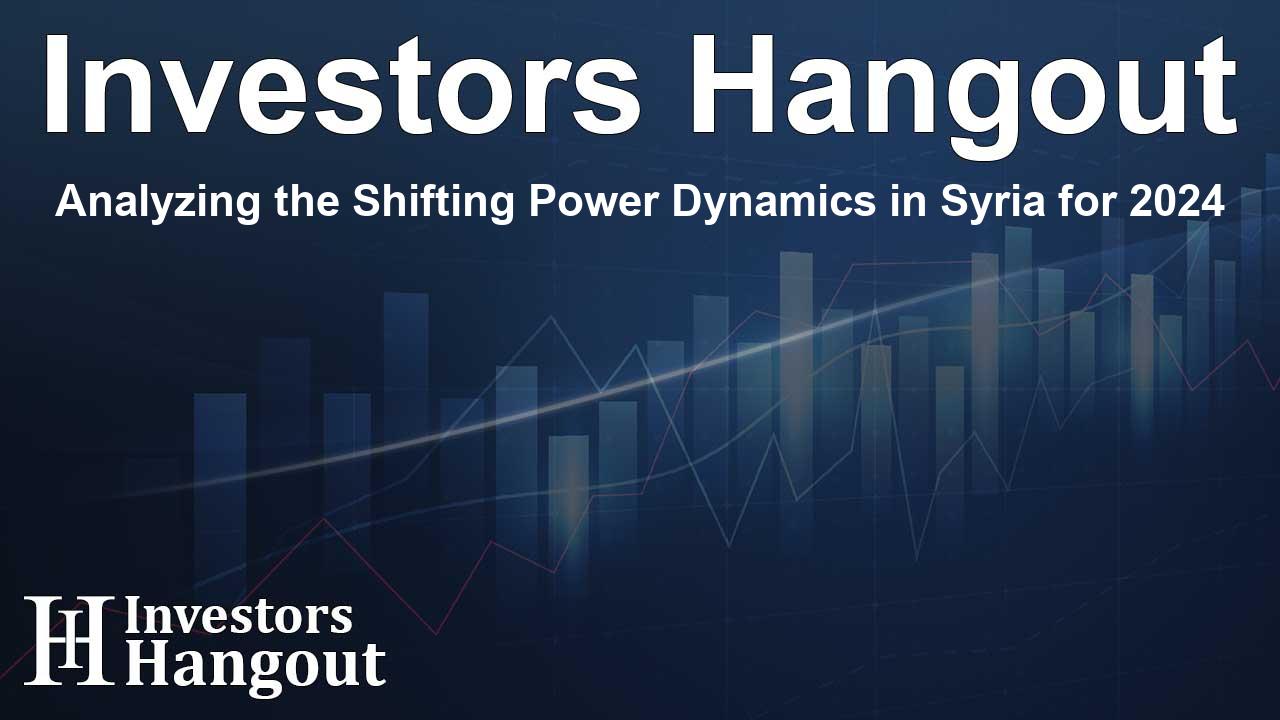Analyzing the Shifting Power Dynamics in Syria for 2024

Understanding Syria's Evolving Political Landscape
Recently, significant developments have emerged in Syria, reshaping its political landscape and influencing regional dynamics. The fall of the previous regime has marked a pivotal moment, raising critical questions about the future governance of the country. As the new authority takes shape, international observers are eager to understand how the situation will unfold.
New Leadership and Russian Alliances
The new leadership under Ahmed al-Sharaa is indicative of a transformative period for Syria. In interviews, al-Sharaa emphasized the importance of continuing strong ties with Russia. These interactions are vital as they outline the future of military cooperation, particularly concerning the crucial Russian bases located strategically within the region.
The Role of Russia in the Middle East
Russia's role in Syria has evolved dramatically in light of recent changes. While European officials hope for a shift away from Russian dominance, many analysts suggest that Moscow's continued presence could provide necessary stability amid uncertainty. This is particularly noteworthy given Russia's previous collaborations with factions worldwide, showcasing their capacity to adapt to changing geopolitical landscapes.
Shifts in Russian-Syrian Dynamics
Analysts have observed a shift in Russian media terminology surrounding Hayat Tahrir al-Sham (HTS). The group is now often referred to as an "armed opposition group" rather than being labeled as terrorist activists. This changing narrative could represent a potential for collaboration, pivoting to mutual interest in stabilizing Syria’s fractured governance.
The Implications of Russian Presence
The potential collaboration between Russia and HTS raises intriguing avenues for further international acceptance of HTS and a reduction in dependence on other regional powers like Turkey. For Russia, maintaining influence in Syria aligns with broader strategic objectives, facilitating a strong foothold in the Mediterranean and enhancing their political leverage across the region.
Geopolitical Outcomes of Collaboration
The prospect of a partnership could prove beneficial for both entities. HTS might find an avenue for increased legitimacy on the international stage while simultaneously offsetting the influence of U.S. support for Kurdish groups in the region. Meanwhile, Russia enhances its regional strategy by solidifying its presence and ensuring its geopolitical interests are preserved.
Challenges Ahead and Regional Stability
As the Syrian government navigates rebuilding efforts, including managing territorial disputes and addressing the threats posed by extremist groups, the implications of Russian involvement become increasingly complicated. The European Union's apprehension towards Russia's military footing in Syria is also noteworthy, as analysts suggest that Moscow's participation could mirror European security interests, leading to collaborative frameworks that address shared concerns.
Humanitarian Implications and Security Concerns
The release of political prisoners and individuals with potential ties to extremist factions raises significant security dilemmas for both the Middle East and Europe. With increasing pressures related to refugee returns, the dialogue surrounding these matters becomes crucial. Russia's experience in counterterrorism can play a vital role in helping manage this challenging landscape.
Conclusion: Russia's Strategic Importance
The involvement of Russian forces in Syria encapsulates more than mere strategic interests; it also reflects the dynamics affecting global stability. As Syria embarks on the challenging path toward governance restructuring and regional tension resolution, Russia's role may ultimately define the nation's future trajectory. Each stakeholder must carefully consider the implications of these evolving relationships, as their decisions will ripple through the broader geopolitical arena.
Frequently Asked Questions
1. How has the fall of the Assad regime affected Syria's politics?
The fall of Bashar al-Assad’s regime has led to a power vacuum, prompting discussions on new governance and foreign alliances, particularly with Russia.
2. What is the significance of the Russian military presence in Syria?
Russia's military presence serves as a stabilizing force and strengthens Moscow's influence over geopolitical dynamics in the Mediterranean.
3. Who leads the new Syrian authority?
Ahmed al-Sharaa has stepped into a leadership role, emphasizing continued strategic partnerships, notably with Russia.
4. How do external powers view the current situation in Syria?
External powers, especially the EU, are concerned about Russia's role in Syria, balancing interests in stability with the risks of extremism.
5. What are the main concerns regarding refugee returns to Syria?
Concerns revolve around the security of returning refugees amidst ongoing tensions and the presence of released political prisoners linked to terror groups.
About Investors Hangout
Investors Hangout is a leading online stock forum for financial discussion and learning, offering a wide range of free tools and resources. It draws in traders of all levels, who exchange market knowledge, investigate trading tactics, and keep an eye on industry developments in real time. Featuring financial articles, stock message boards, quotes, charts, company profiles, and live news updates. Through cooperative learning and a wealth of informational resources, it helps users from novices creating their first portfolios to experts honing their techniques. Join Investors Hangout today: https://investorshangout.com/
Disclaimer: The content of this article is solely for general informational purposes only; it does not represent legal, financial, or investment advice. Investors Hangout does not offer financial advice; the author is not a licensed financial advisor. Consult a qualified advisor before making any financial or investment decisions based on this article. The author's interpretation of publicly available data shapes the opinions presented here; as a result, they should not be taken as advice to purchase, sell, or hold any securities mentioned or any other investments. The author does not guarantee the accuracy, completeness, or timeliness of any material, providing it "as is." Information and market conditions may change; past performance is not indicative of future outcomes. If any of the material offered here is inaccurate, please contact us for corrections.